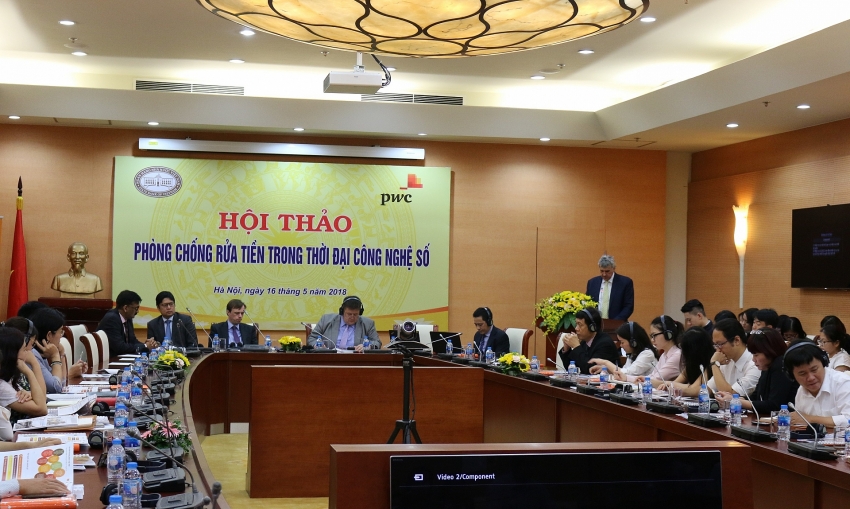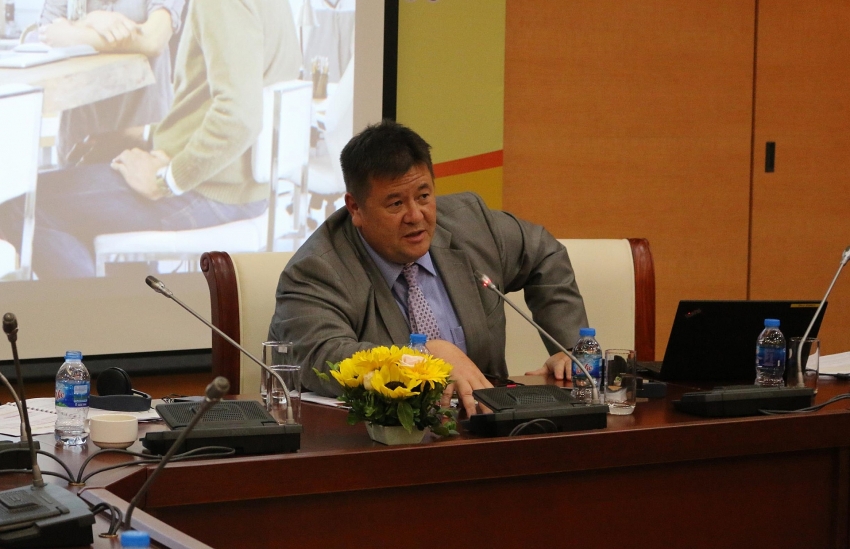New technologies to prevent anti-money laundering activities
At the workshop featuring “Readiness to conquer challenges in anti-money laundering and employ new technology trends in the Fintech era,” recently held by the State Bank of Vietnam (SBV) and PricewaterhouseCoopers Consulting Vietnam, a member of the global PwC network, experts shared that the increased diversity of financial transactions and the emergence of new, disruptive technologies in the modern and integrated world have given rise to numerous challenges for Vietnamese commercial banks in complying with anti-money laundering (AML) regulations now and in the future.
 |
| The workshop brough together leading experts from Vietnam and the region |
Through its 2018 Global Economic Crime and Fraud report, PwC thus revealed a number of findings related to AML, including the need for stricter regulatory environments and the application of disruptive technologies to aid AML activities.
“There are many challenges that have been identified during the implementation of AML in the region. These include the limited use of technology, the lack of tone at the top, ineffective customer risk scoring, KPIs not matching responsibilities, and transaction monitoring personnel lacking the necessary capabilities and experience to detect suspicious activities and deliver quality reports, just to name a few,” said Alex Tan, leader of Forensics Services at PwC Malaysia.
“Inappropriate technology is also a big challenge, as it leads to poor data feeds, lack of data, as well as transaction monitoring systems that do not fit for purpose or do not cover all operations,” said Tan.
 |
| Alex Tan, leader of Forensics Services at PwC Malaysia |
According to Nguyen Van Ngoc, head of the AML Department under the Banking Supervisory Agency of the SBV, the central bank has been cooperating with related governmental agencies to carry out various programmes to transform the AML legal framework and provide guidance on AML implementation according to international best practices.
These changes have been pursuant to the National Action Plan on Anti-Money Laundering and Combating the Financing of Terrorism in the Period of 2015-2020, following the Prime Minister’s Decision No.2112/QD-TTg dated November 25, 2014.
In order to improve the effectiveness of AML implementation, Ngoc stressed that commercial banks across the financial system will need to be proactive.
Grant Dennis, general director of PwC Consulting Vietnam, said that Vietnamese banks should strengthen awareness programmes about AML across different levels and functions in their organisations. Most importantly, there needs to be a strong tone at the top and strict enforcement actions for breaches of AML compliance.
“It is not just about compliance and safeguarding reputation. Strengthening AML capacity can help banks improve the quality of their operations and decrease risks in international transactions. To realise that, banks’ leaders will need to be active in setting clear directions and monitoring this important function,” said Dennis.
In order to help commercial banks solve such problems, the speakers at the workshop presented some best practices in governance and new technology solutions that are starting to get a foothold in developed markets, such as biometric technology for customer on-boarding and robotic process automation for transaction monitoring.
At the workshop, representatives from commercial banks also had a chance to share their own AML practices and submit queries and recommendations about AML implementation.
“AML is an area where close collaboration across the banking system is needed. Money laundering schemes can often be very complex. Each individual bank can only see a small piece of the picture. Only through collaboration with the regulator and other banks will they be able to see the big picture and carry out their AML programmes effectively,” said Richard Major, leader of PwC’s Financial Crime Unit in Southeast Asia.
What the stars mean:
★ Poor ★ ★ Promising ★★★ Good ★★★★ Very good ★★★★★ Exceptional
 Tag:
Tag:
Related Contents
Latest News
More News
- Citi sharpens its focus on institutional banking (February 09, 2026 | 19:58)
- SSC steps up engagement with FTSE Russell on market reforms (February 09, 2026 | 17:33)
- IFC considers $50m trade finance guarantee facility for Nam A Bank (February 09, 2026 | 17:28)
- Hoa Phat Agricultural Development debuts shares on HSX (February 06, 2026 | 14:00)
- Vietcap’s VAD 2026 draws strong global investor turnout (February 06, 2026 | 13:30)
- New rules ease foreign access to Vietnam equities (February 05, 2026 | 17:29)
- 0.1 per cent tax proposed on each transfer of digital assets (February 05, 2026 | 17:27)
- Ministry of Finance tightens policy delivery at start of year (February 05, 2026 | 17:26)
- Vietnam steps up market reforms as FTSE Russell reviews upgrade progress (February 05, 2026 | 17:20)
- 2025 profits mixed amid strong energy and farming results (February 05, 2026 | 17:18)






















 Mobile Version
Mobile Version